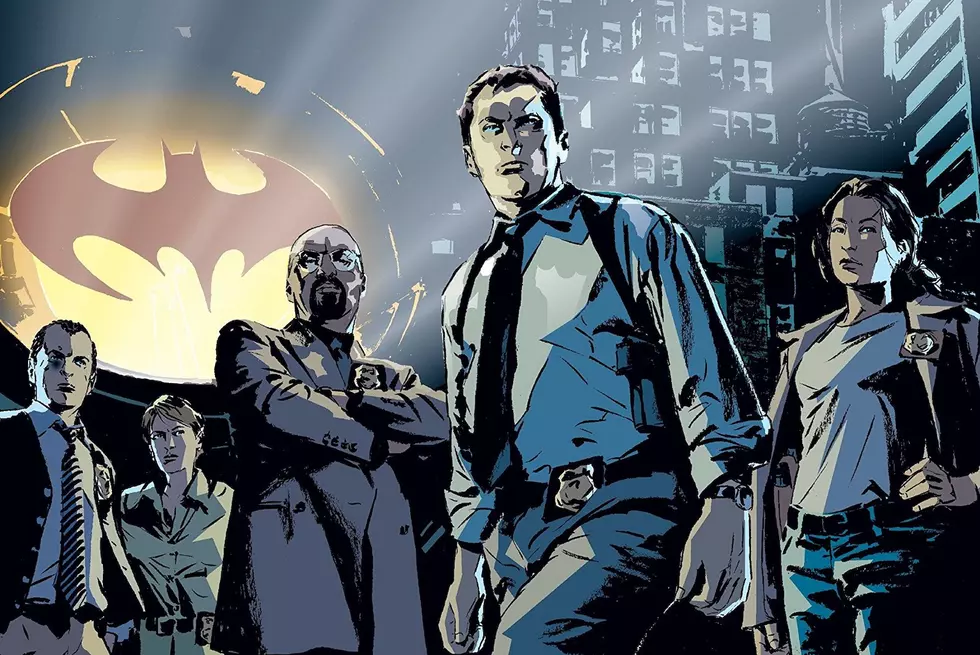
Ask Chris #163: Nobody Gets Better In Arkham
Q: Does Arkham have any success stories and if not, how does it continue to get funding? -- @TheMikeLawrence
A: I'll be honest with you, Mike: If you look at it logically, Arkham Asylum is a genuinely terrible mental hospital. Heck, even if you just look at it by the standards of comic book penal institutions, which only exist so that crooks can escape from them and occasionally provide something for Hank Pym to do in his spare time so he's not just some weird due who stares at an ant farm all day, Arkham is just the worst.
But really, it's not so much what Arkham has done that keeps it around, as what it has the potential to do.
To answer your first question, there have been a few -- very few -- cases where Arkham inmates have successfully been reformed, at least for a little while. The best example is probably that run of Detective Comics by Paul Dini and Dustin Nguyen that saw the Riddler going straight and becoming a private investigator. Admittedly, this might not be the best example when you consider that he was only doing it in an attempt to beat Batman at his own game by solving crimes rather than committing them, but still. When your starting point involves actually building question mark-shaped deathtraps and committing armed robbery at the Game Show Museum, even just channeling a psychosis towards something that's not technically illegal is a pretty positive step. Besides, Dini's scripts presented the change as a pretty genuine desire to move forward with his life, and if nothing else, it's the story that got us out of what might've actually been the single dumbest part of Hush. I think we can call that a victory all around.
Even more sincere -- but way less well-known -- would be Carl Bork, a one-shot villain from the '70s who was trounced by Batman, did his time, and then put his super-strength to good use as a member of Kurt Busiek and Tom Grummett's Power Company, a team of superheroes looking to turn a profit with their skills. But again, I'm not actually sure if he was ever sent to Arkham or not. I mean, I'd guess that he was since he was a weird looking dude who fought Batman, but it's just as likely that he did a nickel at Blackgate with the rest of Gotham's City's not-actually-insane criminals. Either way, The Power Company's well worth tracking down if you're into digging through back issue bins -- it's Heroes For Hire as a law firm in the DC Universe.
So let's see here. Bork, the Riddler that one time and... huh. I think that's it. Well, there's Harley Quinn in that "Harley's Holiday" episode of Batman: The Animated Series, but that only lasted an afternoon, and I'll come back to that later. Arkham has really done a pretty terrible job at helping people work out their issues.
And really, it's pretty easy to see why. I once read an article by a psychiatrist who talked about how flat-out terrible Arkham was for the mentally ill, even from a design standpoint. If you've ever been to a modern mental hospital, you may have noticed that they tend to favor wide hallways and brightly lit rooms over, say, man-sized air vents and leering gargoyles in shadowy crevices that are, in defiance of all architectural traditions, situated inside the building. There's a pretty good reason for that, namely that most people tend to get kind of stressed out in horrifying gothic mansions, even when they aren't sharing a cellblock with a murder clown. It's not a very conducive environment for getting your mind right.
Now, obviously, there are a lot of reasons for that, and most of them are right there on the surface. The most obvious, of course, is that it doesn't need to be a place where people are going to get better because none of those characters are ever going to get better. If they did, we'd never get another story where Batman punches them in the face, which is kind of their entire reason for being there in the first place. If the Joker starts responding well to therapy and antidepressants, then we don't get any more Batman vs. Joker stories -- and in theory, we should want to read more about these characters. It's the same idea behind why superheroes don't kill, just applied to a slightly different fate for arch-criminals. If they go away, we can't read about them, and generally speaking, the entire model of long-form serialized storytelling is built on these characters coming back.
That's one of the reason Bork and Riddler are the first (and only) examples of Arkham's success that spring to mind. The Riddler's one of those few examples where a "reformation" moved his character forward in an interesting new way that allowed him to remain an antagonist, and with all due respect to Bob Haney and Neal Adams, I don't think anyone read "BUT BORK CAN HURT YOU!" and wrote in demanding to see more of the sensational character find of 1968. Then again, that was the issue where the Flash ran to the sun.
There's another reason that's pretty easy to pin down, too: For all of their fighting to avoid going back there, Arkham is kind of the villains' headquarters, and as such, it reflects how they operate. Batman may have a big dark cave that he hangs out it, but it's also just the basement of his billion-dollar mansion that has room for a dozen custom cars (and planes, and helicopters, and at least one submarine) and is tended to by a kindly Englishman who makes sandwiches. Dude even has Wifi down there. The password, by the way, is "batman."
Point being, as much as Arkham is a prison for the villains, it's also their territory. The idea of "the lunatics running the asylum" has been literalized more than a few times over the years, but even when they're just hanging out there waiting for their turn to get out and try to heist the Egyptian Cat Statues (there's a waiting list you can sign up for in the cafeteria), Arkham is theirs. That's why it's the place where Batman goes when he needs to confront them for whatever reason, and why it's always depicted as not just a place housing evil people, but as a place that has a weird sinister quality all on its own. Batman's the one putting them there, sure, but in a lot of ways, it's their home.
But there's one more thing about Arkham that's very, very important that only really exists in the subtext of the stories. You ask about how Arkham keeps getting funded if it's a terrible and ineffective mental hospital, and it is, and I'm pretty sure that the in-story reason for it (or at least one of them) is that they get pretty generous grants from the Wayne Foundation. Bruce Wayne has been shown more than a couple of times as being someone with personal pull at Arkham, so the question becomes about him. Why would Batman, a guy who prizes effectiveness above all, who always has the plan and even chose a costume designed to strike fear and make his job easier, keep putting money into something that just isn't working?
There's a good reason for it, just like there's a good reason for Bruce Wayne to be someone who's dead set against the idea of killing someone, and it's rooted in the same place. As much as people tend to think of Batman as being a psychologically dark character who's rooted in a desire for vengeance, there's a childlike quality to his origin story that I've written about before, and once you see it, it casts everything in a different light. Batman might be scary, but he's also someone who decided as a child to end all crime, and then dedicated his adult life to making that happen. There's a really strong element of hope to that, and while Batman's optimism is often played down in favor of his pragmatic, analytical nature, he's not a cynic. If he was, he wouldn't bother to do what he does or stick to a moral code, no matter how pissed off he was about his parents getting shot. You have to be optimistic to be a hero.
And a huge part of that optimism is that he takes his enemies to an Asylum.
Again, there's a super obvious reason for that. Batman's enemies, more than anyone else's in comics, aren't just straight up criminals. They tend to be psychologically damaged in some way, usually -- and this is the key part -- in a way that reflects an aspect of Batman himself. That's why he's got the most compelling villains in comics. Then you have Batman, who lived through a pretty traumatic moment, and he knows how much something that can hurt, and how it can warp your entire life -- especially if it's something as on the nose as Mr. Freeze losing someone that he loved because he just couldn't save her. He had to go to some pretty extreme lengths to deal with that and channel it into something positive.
I'm the first person to reject that tired idea that Batman's just as crazy as the criminals he fights (because if he is, then why the hell would we want to see him win?) but I do think that there's an element of sympathy between them. There's an understanding there, and since Batman has the kind of nobility that drives him to wage an unending war on crime and keep people from suffering like he did, I think that sympathy comes into play every time he wins. He doesn't kill his enemies, even the ones he hates. He takes them to an asylum, the one place where maybe they can be helped.
That's what an asylum is, after all. The word's got a bad enough connotation that we don't even really use it anymore, but it actually means a place of refuge where somebody can get help. It's why those places exist, and even if Arkham is a pretty terrible place that's occasionally been written as being literally cursed by demons and having a floor plan inspired by the nine circles of Hell, it's still an asylum, and it's still run by a doctor, not a warden. In superhero comics, where even the most wrongheaded storylines can never really stamp out that strain of heroic optimism that they're built around, that means something.
Going back to "Harley's Holiday," I think that might be the best illustration of that idea in the character's history. By any standard you apply, Harley Quinn is not really a good person. Her boyfriend's killed more people than gunpowder, and even though she's the victim of psychological manipulation and physical abuse (both of which get pretty dark for a show for ten year-olds), she's right there along with him, willingly aiding and abetting all the reservoir-poisonings, cake explosions and other general murders. That's her tragedy, and if it's not the Joker, it's Ivy, another character with a perfectly justifiable tendency towards murder. But she's also someone who doesn't have to be that way. We see it, and more importantly, Batman sees it. She's one of the few characters that he's actually nice to more than once in the show, and if he can have an understanding and sympathy for her, a person who's pledged her life to his most hated opposite number, then he can have sympathy for the other characters too.
And it's an idea that actually predates Arkham, too. Every now and then on Batman '66, they'd mention Warden Crichton of Gotham Penitentiary, who was mentioned as having high hopes for rehabilitation. That obviously has its roots in a pretty cynical place for the people writing it -- the subtext being that trying to rehabilitate the crooks was futile and that this line of thinking was exactly why Arch-Criminals were always able to bluff their way past Chrichton and head out to rob the stamp factory before the ink on their parole form was dry -- but for the characters, that was always in place as a rule of the universe. Batman himself often laments that his enemies could make the world a better place if only they would apply themselves to good instead of evil, and while that show might be purposefully corny, it got a hell of a lot more right about that character than it got wrong.
So yeah, Arkham Asylum, the Lovecraft reference that stuck around for 40 years, might not be a great hospital. But as a plot device, you don't get many better.
Ask Chris art by Erica Henderson. If you’ve got a question you’d like to see Chris tackle in a future column, just send it to @theisb on Twitter with the hashtag #AskChris.
More From ComicsAlliance









